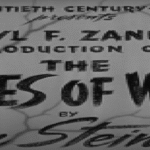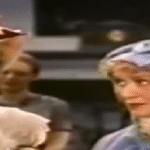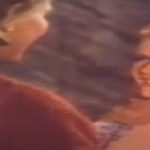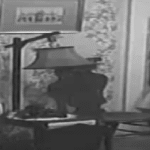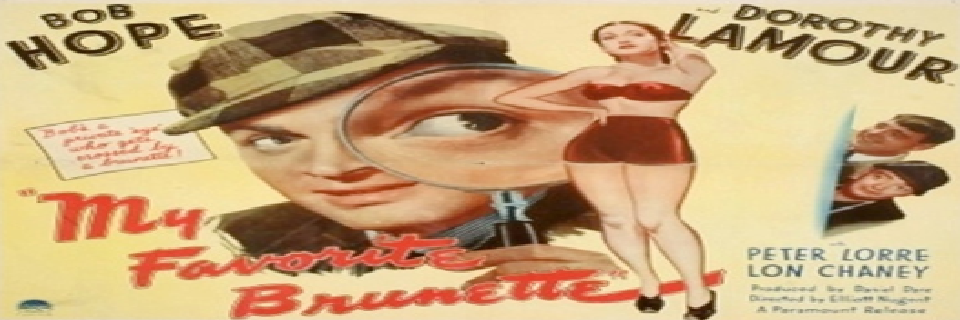My Favorite Brunette, released in 1947, is a comedic send-up of the hard-boiled detective genre, blending mystery, romance, and satire in a way that reflects both the charm and wit of post-war Hollywood. Starring Bob Hope and Dorothy Lamour, the film plays with the conventions of film noir and detective thrillers while delivering a playful narrative centred on mistaken identity, amateur sleuthing, and classic romantic entanglements.
The story unfolds through a clever framing device, with the protagonist, Ronnie Jackson, recounting his misadventures from a prison cell while awaiting execution. Ronnie is a timid, wisecracking baby photographer in San Francisco, working in an office adjacent to a private detective named Sam McCloud. Ronnie dreams of a more exciting life, romanticising the gritty world of private investigation that he observes from across the hallway. He often imagines himself as a hard-nosed detective, dealing with dangerous criminals and alluring femme fatales, but in reality, he is unprepared for the chaos that awaits him.
His mundane life takes a dramatic turn when Carlotta Montay, a mysterious and glamorous woman, mistakes him for McCloud and barges into his office seeking urgent help. She believes her uncle, Baron Montay, has been kidnapped, and she is being pursued by a group of ruthless criminals. Ronnie, flustered but flattered by the attention, plays along and assumes McCloud’s identity, swept up in the thrill of the situation. What begins as a harmless bit of role-play quickly turns serious when he becomes entangled in an actual criminal conspiracy.
Carlotta leads Ronnie into a labyrinth of danger involving espionage, hidden maps, and murder. The antagonists are a sinister group led by the suave but menacing Major Sebastian and the equally dangerous Kismet, both after a top-secret map related to uranium deposits. The film makes playful references to real-world post-war tensions, using the trope of valuable information as a vehicle for comedic intrigue.
Ronnie’s impersonation of a detective becomes increasingly precarious as he blunders through interrogations, sneaks into shadowy mansions, and tries to navigate double-crosses and disguises. Although he lacks the competence or courage typical of traditional noir protagonists, he survives largely through luck, misunderstandings, and the occasional flash of reluctant bravery. His comedic commentary and self-deprecating humour make him a likeable, if unconventional, hero.
Carlotta remains a consistent enigma throughout much of the film. She is charming, clever, and seemingly always one step ahead of Ronnie, although she too is caught in a web beyond her control. While playing the archetypal ‘dame in distress’, she is also resourceful, using Ronnie’s confusion to her advantage. Their relationship shifts from professional (albeit under false pretences) to romantic, providing the film with both emotional tension and comedic friction.
As the story progresses, Ronnie is framed for murder when a man is killed in his presence and all the evidence points to him. His attempts to clear his name only deepen the suspicion around him, and the police, seeing him as a delusional amateur meddling in serious affairs, begin to close in. His only ally remains Carlotta, though even she vanishes at a crucial moment, leaving Ronnie to fend for himself.
Ronnie’s efforts to uncover the truth lead him into increasingly absurd situations, including being committed to a sanatorium by the villains and escaping in disguise. Along the way, the film plays with various genre clichés: shadowy alleyways, mysterious contacts, mistaken identity, and hidden compartments. The juxtaposition of noir style with Hope’s comedic persona undercuts the tension with levity, while still moving the plot forward with a sense of momentum and mystery.
Eventually, Ronnie discovers that the real McCloud has been kidnapped and that Carlotta’s uncle, Baron Montay, is indeed being held prisoner by Major Sebastian and his associates. After a series of misadventures, Ronnie manages to rescue McCloud, unravel the criminal plot, and recover the secret map. His antics ultimately expose the villains, though not without significant chaos and close calls.
Despite having resolved the case, Ronnie’s masquerade leads to his arrest and trial for murder, bringing the story full circle to the prison setting introduced at the beginning. As he prepares for what seems like his final moments, the truth is revealed and Carlotta appears in time to exonerate him. The real culprits are exposed, Ronnie is released, and he emerges not only a free man but a reluctant hero. The ending is light-hearted and romantic, with Ronnie and Carlotta walking off together, the bumbling photographer having stumbled into heroism and love alike.
The film thrives on Bob Hope’s unique brand of humour. His delivery is sharp, self-aware, and filled with one-liners that poke fun at both the genre and his own inadequacies. He constantly breaks the tension with asides and sarcastic remarks, which sets the film apart from the more serious detective films it parodies. Dorothy Lamour, playing Carlotta with a blend of mystery and elegance, complements Hope’s antics with poise and subtle humour, grounding the film’s more outlandish elements in a believable emotional core.
Stylistically, My Favorite Brunette makes full use of the black-and-white format to echo the visual language of noir: sharp contrasts, dramatic shadows, and ominous cityscapes. The cinematography mimics the genre it parodies, lending authenticity to the spoof without descending into slapstick. Director Elliott Nugent maintains a brisk pace, allowing the comedy and suspense to play off each other in balanced rhythm. The supporting cast, including Peter Lorre as the creepy Kismet and Lon Chaney Jr. in a comic role as a dim-witted thug, add to the film’s charm and tonal versatility.
In addition to entertaining audiences, the film playfully critiques American fascination with heroism and masculinity. Ronnie Jackson, far from being a hard-edged man of action, is an everyman figure, nervous and unsure of himself, yet ultimately driven by decency and affection. His journey is not about mastering violence or asserting dominance, but about confronting fear with wit and stubborn persistence. The film suggests that heroism can be accidental, and that courage may come not from strength but from loyalty and love.
My Favorite Brunette stands as an example of Hollywood’s post-war shift towards genre experimentation and self-parody. It reflects a moment when the lines between comedy and drama, homage and satire, were becoming more fluid. The film manages to affectionately poke fun at the noir style while delivering a compelling, well-structured narrative of its own. With its clever script, strong performances, and memorable characters, it remains a delightful blend of suspense and humour, capturing the spirit of an era that was learning to laugh at its own cinematic traditions.

